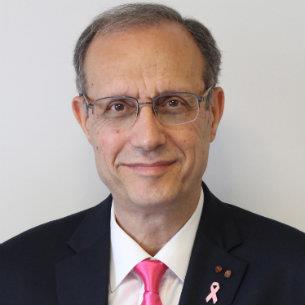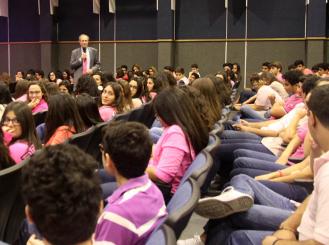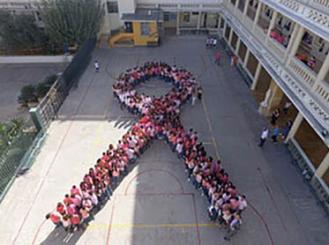Coauthored with Rita Saroufim, MD, and Sarah Daouk, MD
October, as Breast Cancer Awareness Month, was very busy this year in Lebanon. In addition to press and media campaigns with the Ministry of Health, lectures at various medical, corporate, and community centers, billboards, and fundraising events, I was invited by the College des Saints Coeurs-Sioufi, Beirut, Lebanon. We gave the 500 secondary school students and their teachers a formal lecture, with PowerPoint slides, followed by a long and rich session of questions and answers.
When asked, a good number of students expressed their desire to become physicians. Their spirits were boosted when we told them that they are the future, and that our society depends on smart students in order to advance.
Students asked about cancer statistics and causes, so we explained that Lebanon, a country of 4 million people, has 8,000 new cancer cases each year; 4000 are in women, of which 1,800 are breast cancers. Only 5% to 10% of breast cancers are hereditary. Global statistics show that one out of eight women develop breast cancer during their lifetime. Early detection and screening are critically important to detect breast cancer before it manifests itself and become large and advanced. Women should become familiar with the shape and consistency of their breasts, see a physician every 3 years between age 20 and 40, and every year after age 40. Although international recommendations are changing and the American Cancer Society now recommends staring at age 45, screening mammography is still recommended yearly after age 40 in Lebanon, because 50% of cases are diagnosed before the age of 50. Our presentation emphasized quality in order to optimize health care and minimize errors, unnecessary procedures, and faulty treatments.
We explained basic medical knowledge about the development of cancer from a normal cell. Students were attentive and glad to hear that their biology class lessons about cell growth and cell cycle are translated into real-life medical interventions and patient care. Students were encouraged to always work to understand what they are taught and search for answers. They were eager to understand how we counteract cell growth with anti-hormone therapy as well as with chemotherapy and targeted therapy. There was a sense of relief among the teachers and students that new advances in management allow women with breast cancer to keep their breasts and experience improved quality of life.
Students asked questions about causes of cancer. We explained that 30% of all cancers are caused by tobacco smoking. When asked if they smoke, none of them said yes. Teachers confirmed that their school is a smoke-free campus and that even teachers do not smoke there. Students cheered when we proposed that the price of a pack of cigarettes should be high enough (20,000 Lebanese pounds, equivalent to $14 USD) in order to prevent teenagers from buying them from their daily allowances. Studies have shown that higher prices are effective for reducing smoking. Another 30% of cancers are caused by unhealthy diet and lifestyle, so we encouraged students to eat healthy food, increase their intake vegetables and fruits, reduce animal fat, and perform regular exercise.
Dangers from the Lebanese garbage and waste crisis were discussed. Students were already sensitized to the issue and they showed that they have taken initiatives in school to separate waste and recycle.
Teachers asked about vaccines and prevention of cancer of the cervix. We wanted the students to understand the relationship between HPV and cancer of the cervix. People in our community pay out of their pocket the equivalent of $100 to $200 USD for each dose of the HPV vaccine and may not be fully informed about needs and age of vaccination. It was important to explain that HPV is a virus is spread by sexual contact, and that likelihood of its transmission is increased with multiple partners. The vaccine should be administered before initiating sexual activity. If girls do not receive the vaccination at the recommended ages of 11 to 12 years, it is fine to get vaccinated at a later age, before sexual activity. Our government should try to make the vaccine available at a lower cost through international organizations, and make it available to all people eligible for it.
At the end of that morning session, students surprised us by organizing a human pink ribbon in the school’s playground and setting up a drone to take pictures of the ribbon. It was a great event.
Students are our future, and health education in schools should be a priority worldwide.




Recent posts